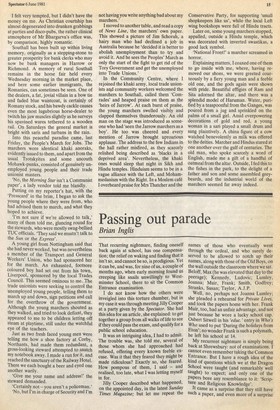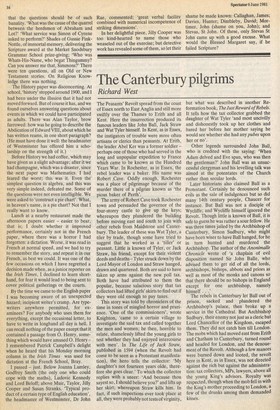Passing out parade
Brian Inglis
That recurring nightmare, finding oneself back again at school, has one compensation; the relief on waking and finding that it isn't so, and cannot be so, is prodigious. Yet it can be, and was, for nine of us, a couple of months ago, when early morning found us creeping like snails unwillingly to Westminster School, there to sit the Common Entrance examination.
I do not know how the others were inveigled into this torture chamber, but in my case it was through meeting Jilly Cooper at a party given by the Spectator. She had this idea for an article, she explained: to get together a group from all walks of life to see if they could pass the exam, and qualify for a public school education. It was an intriguing idea, I had to admit. The trouble was, she told me, several of those whom she had approached had refused, offering every known feeble excuse. Was it that they feared they might be made ridiculous? Exactly so, she feared. How pompous of them, I said — and realised, too late, what I was letting myself in for.
July Cooper described what happened, on the appointed day, in the latest Sunday Times Magazine; but let me repeat the names of those who eventually went through the ordeal, and who surely deserved to be allowed to notch up their names, along with those of the Old Boys, on the wall outside the classroom where we sat. Beloff, Max (he was elevated that day to the peerage); Kennedy, Ludovic; Lumley, Joanna; Muir, Frank; Smith, Godfrey; Stranks, Susan; Taylor, A. J.P. Well, no, perhaps not Joanna Lumley; she pleaded a rehearsal for Private Lives, and took the papers home with her. Frank Muir, too, had an unfair advantage, and not just because he wore a lucky school cap. Osbert Sitwell in his `educ.' entry in Who's Who used to put 'During the holidays from Eton'; no wonder Frank is such a polymath, he left his school at 14.
My recurrent nightmare is simply being back at Shrewsbury: not of examinations. I cannot even remember taking the Common Entrance. But I have a rough idea of the kind of questions which we at the Dragon School were taught (and remarkably well taught) to expect; and only one of the Papers bore any resemblance to it: 'Scripture and Religious Knowledge'. It came as a surprise that they still have such a paper, and even more of a surprise that the questions should be of such banality. `What was the cause of the quarrel between the herdsmen of Abraham and Lot?' What service was Simon of Cyrene asked to perform?' Shades of Gussie FinkNottle, of immortal memory, delivering the Scripture award at the Market Snodsbury Grammar School prize-giving; 'Who was VVhats-His-Name, who begat Thingummy?
Can you answer me that, Simmons?' There were ten questions, all on Old or New Testament stories. On Religious Knowledge there was nothing.
The History paper was disconcerting. At school, 'history' stopped around 1900, and I had been under the illusion that it had not moved forward. But of course it has, and we found ourselves answering questions about events in which we could have participated as adults. There was Alan Taylor, brow furrowed: how was he going to describe the Abdication of Edward VIII, about which he has written reams, in one short paragraph? (He must have done it well: the headmaster of Westminster has offered him a scholarship on the strength of it.) Before History we had coffee, which may have given us a slight advantage; after it we had champagne, which was a disaster, since the next paper was Mathematics. I had feared the worst; this was it. Even the simplest question in algebra, and this was very simple indeed, defeated me. Some of the questions were not even intelligible. We were asked to 'construct a pie chart'. What, in heaven's name, is a pie chart? Not that I really want to know..
Lunch at a nearby restaurant made the afternoon papers easier — easier to bear, that is; I doubt whether it improved performance, certainly not in the French paper, where there was a horror I had forgotten: a dictation. Worse, it was read in French at normal speed, and we had to try to remember the story, and repeat it in our French, as best we could. It was one of the few occasions on which I have regretted a decision made when, as a junior reporter on the Irish Times, I declined to learn shorthand, for fear it would lead to being sent to cover political gatherings or the courts.
By the time we came to the English paper I was becoming aware of an unexpected hazard; incipient writer's cramp. Are typewriters anywhere permitted, for examinees? For anybody who uses them for everything, except the occasional letter, to have to write in longhand all day is hell. I can recall nothing of the paper except that it contained a passage from 0. Henry, something which would have amused 0. Henry — I remembered Patrick Campbell's delight when he heard that his Monday morning column in the Irish Times was used for dictation at the French School, Bray.
I passed — just. Below Joanna Lumley, Godfrey Smith (the only one who could cope with the maths), Ludovic Kennedy and Lord Beloff; above Muir, Taylor, Jilly Cooper and Susan Stranks. 'Typical product of a certain type of English education', the headmaster of Westminster, Dr John Rae, commented; 'great verbal facility combined with numerical incompetence of striking dimensions'.
In her delightful piece, Jilly Cooper was too kind-hearted to name those who weaseled out of the exercise; but detective work has revealed some of them, so let their shame be made known: Callaghan, James; Davies, Hunter; Dimbleby, David; Mortimer, John (shame on you, John); and Stevas, St John. Of these, only Stevas St John came up with a good excuse. What would the Blessed Margaret say, if he failed Scripture?











































 Previous page
Previous page